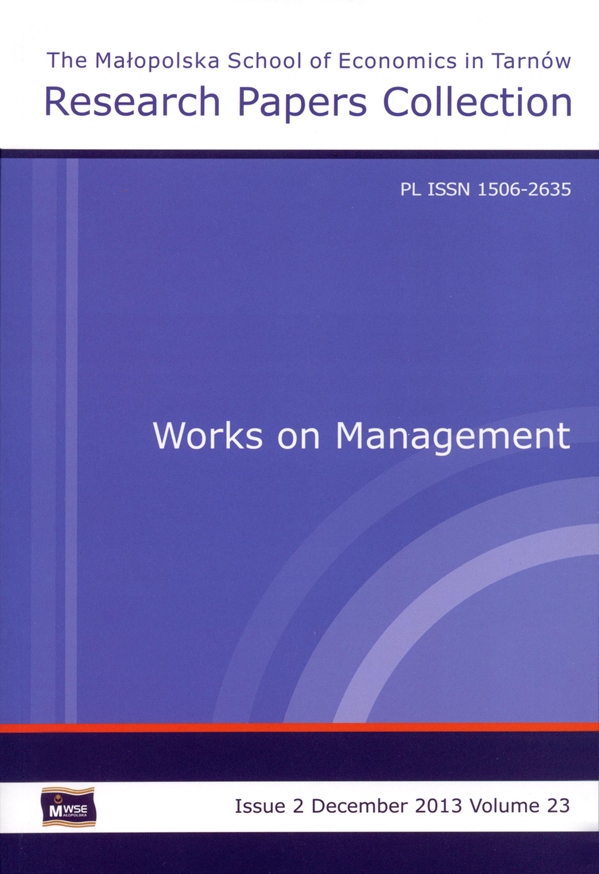Abstract
Globalization process has created awareness of the need for sustainability, as well as the role of stakeholders. Organization’s stakeholders have ever increasing expectations for organizations to act in a responsible and sustainable way. Increasing number of organizations are adopting the mission statements that relate to sustainable development and Corporate Social Responsibility. As one of the results of globalization, International Organization for Standardization has been creating and developing ISO standards, which are to be a guideline in managing areas of the most importance for the organization. One of those standards is ISO 26000 norm, a guideline for Corporate Social Responsibility. The 26000 norm defines the meaning of the term Corporate Social Responsibility and clarifies its link to sustainable development. Although the benefits of its implementation are being emphasized, Corporate Social Responsibility concept is still for many organizations almost impossible to capture and implement. As a management tool made of measurement system, balanced scorecard translates mission into measurable objectives. Since Corporate Social Responsibility is part of ever increasing numbers of mission statements, the aim of this paper was to research the potential of balanced scorecard in comprising the meaning and measuring of the corporate social responsibility concept by analyzing research and professional papers.
References
Commission of the European Communities. Green Paper: Promoting a European Framework for Corporate Social Responsibility [online, accessed: 2013-10-31], 2001. Available online: http://www.csr-in-commerce.eu.
View in Google Scholar
Crawford D., Scaletta T. The balanced scorecard and corporate social responsibility: Aligning values for profit [online, accessed: 2013-10-21], published 23 October 2005. Available online: www.greenbiz.com.
View in Google Scholar
Drexhage J., Murphy D. Sustainable development: From Brundtland to Rio 2012 [online, accessed: 2013-10-21]. United Nations Headquarters, New York 2010. Available online: www.un.org.
View in Google Scholar
Epstein M.J., Wisner P.S. “Using a balanced scorecard to implement sustainability”. Environmental Quality Management, 2001 (Winter).
View in Google Scholar
Figge F. et al. “The sustainability balanced scorecard: Linking sustainability management to business strategy” [online, accessed: 2013-10-31]. Business Strategy and the Environment, 2002. Available online: www.interscience.wiley.com.
View in Google Scholar
Global Reporting Initiative [online, accessed: 2013-11-01]. Available online: www.globalreporting.org.
View in Google Scholar
Gminder C.U., Bieker T. “Managing corporate social responsibility by using the ‘sustainability-balanced scorecard’” [online, accessed: 2013-10-23], paper from the GIN2002 Goteborg Conference Corporate Social Responsibility & Governance for Sustainability, 2002. Available online: https://gin.confex.com/gin/archives/2002/papers/010261Gminder.pdf.
View in Google Scholar
International Organization for Standardization, Guidance on social responsibility—draft international standard ISO/DSI 26000 [online, accessed: 2013-10-31], published 2009. Available online: www.lsd.lt.
View in Google Scholar
Kaplan R.S., Norton D.P. The balanced scorecard: Translating strategy into action. Boston: Harvard Business School Press, 1996, p. 18. ISBN 0875846513.
View in Google Scholar
Lin-Hi N., Müller K. “The CSR bottom line: Preventing corporate social irresponsibility” [online, accessed: 2013-10-31]. Journal of Business Research, 2013. Available online: www.sciencedirect.com.
View in Google Scholar
Nikolaou I.E., Tsalis T.A. “Development of a sustainable balanced scorecard framework” [online, accessed: 2013-11-07]. Ecological Indicators, 2013, no. 34. Available online: www.sciencedirect.com.
View in Google Scholar
Niven P. Balanced scorecard step by step: Maximizing performance and maintaining results. New York: John Wiley & Sons, 2002. ISBN 0471078727.
View in Google Scholar
Oshika T., Saka C., Oka S. Why it pays to be green? An empirical investigation of carbon SBSC [online, accessed: 2013-11-01]. Available online: http://aaahq.org/AM2012/SuppFiles/SuppID_11.pdf.
View in Google Scholar
Rohm H., Montogomery D. Link sustainability to corporate strategy using the balanced scorecard [online, accessed: 2013-10-24]. Available online: https://balancedscorecard.org.
View in Google Scholar
© Copyright by Małopolska School of Economics in Tarnów. The articles are available under the Creative Commons Attribution NonCommercial-NoDerivatives 4.0 International License


